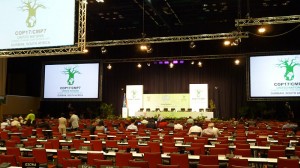
– This editorial is re-posted from the Yale School of Forestry & Environmental Studies official COP 17 blog, found here. It was originally titled, “Speaking but not listening: meeting but not engaging.” –
After four days of COP negotiations it’s apparent that parties need to spend less time delivering statements they have prepared in advance and more time listening to and engaging with the statements of others.
Of course, this problem is as old as multilateral diplomacy itself. Still, that doesn’t mean it can’t be overcome. The COP Presidency seems to agree and hosted a traditional South African Indaba over the past two days to address the issue. A meeting held by the Zulu and Xhosa peoples, an Indaba is meant to bring parties together to discuss a matter of great importance to the community, particularly problems that affect everyone, and to solve intractable or difficult collective challenges. According to the official invite, “Indabas aim at establishing a common mind or a common story that all participants can take with them. In successful Indabas, participants come with open minds motivated by the spirit of the common good, listening to each other to find compromises that will benefit the community as a whole.”
As a part of the COP, the Indaba was meant to encourage parties to engage with one another and to collaborate through a sharing of ideas , thoughts, and feelings about the way forward on combating climate change. It was convened with the explicit purpose of moving beyond prepared statements and to articulate a collective vision for what parties would like to see Durban accomplish.
Instead, parties continued to deliver statements regardless of the context around them. Some (if not most) have a script to read from and a checklist to mark off. They raise the same points and stick to the same statements regardless of this discussion around them. It’s like getting participation points in a college seminar. Others, (the U.S. being the worst example), address the statements of other parties only within the confines of their strict, nonnegotiable negotiating position (oxymoron anyone?). They insist on the involvement of all parties in an international climate regime, but offer no suggestions on how to move forward; they point out that a new solution is needed, but fail to articulate their role in how that solution will be achieved. And still others (the Alba group dominated by Cuba, Venezuela, Ecuador, and Bolivia being a prime example) use the COP to push an ideological agenda. There may be a need for criticism of the world capitalist system dominated by the world’s most developed economies, but not here and not now. Climate change is a serious problem, and a solution will require serious, productive, and creative dialogue. An ideological platform that ostracizes but that does not offer viable alternatives or useful suggestions for collaboration is both harmful to the process and detrimental to planet.
There were some key exceptions at the Indaba. The Bahamas spoke frankly, off the cuff, and engaged with the idea of commitments from all parties, developed and developing. Cape Verde delivered a moving allegory about the Titanic refusing to stop to help a tiny sinking boat. In the story, the small boat sank, but, as we all know, the Titanic hit an iceberg before it could complete its own journey. Applied to climate change, the delegate from Cape Verde pleaded that the island states may disappear in the short-term, but “business as usual” also spells disaster for all states in the long-run. Cape Verde outlined a philosophy for climate negotiations that all parties should adopt. And it articulated the common story that the Indaba was meant to create.